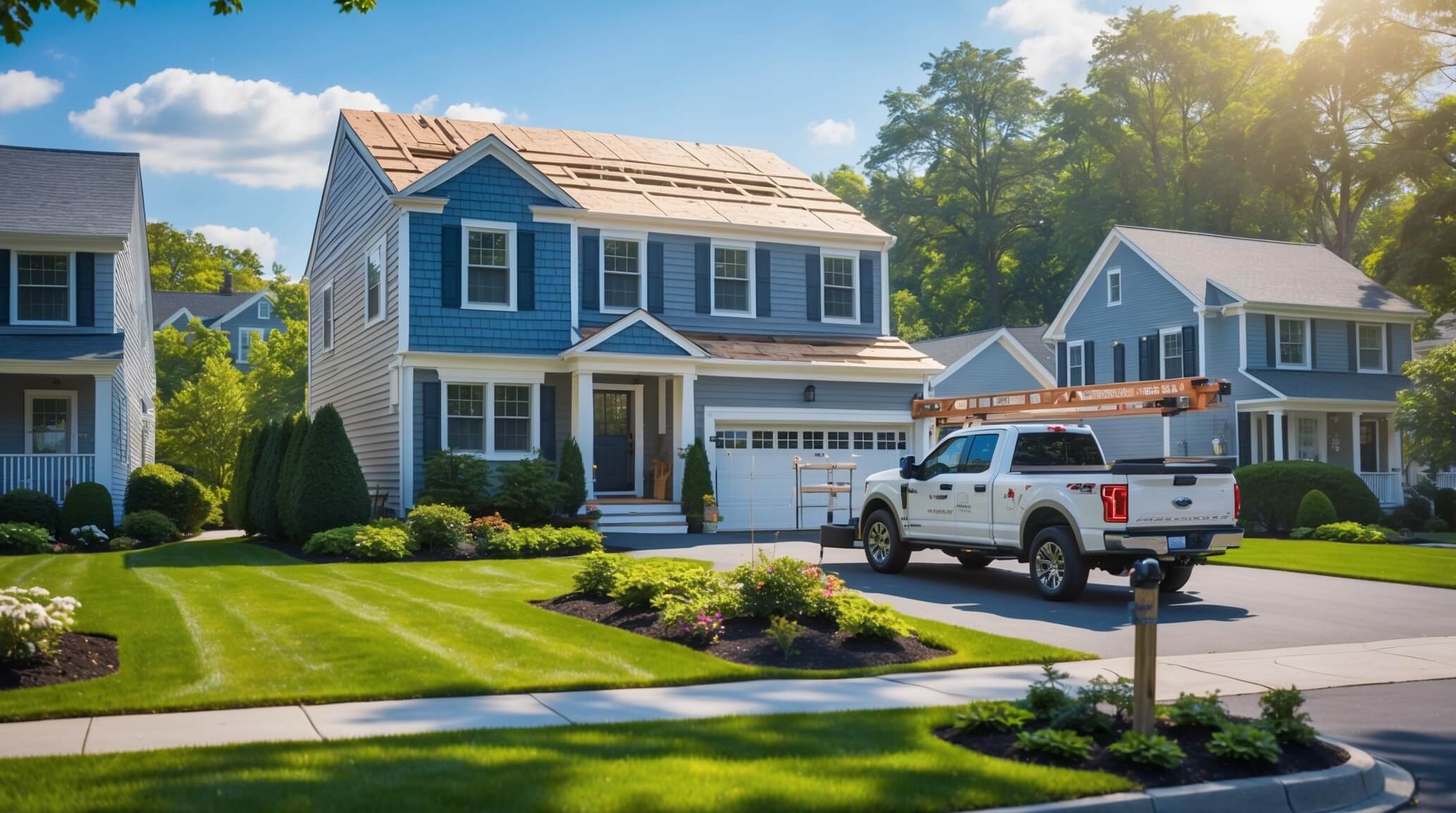A fence permit Massachusetts is a legal document required for installing a fence in Massachusetts, ensuring compliance with local regulations.
Are you considering putting up a fence around your property? Understanding the fence permit Massachusetts is crucial for homeowners and investors alike.
In this post, we’ll dive deep into what a fence permit entails, why it’s necessary, and how to obtain one efficiently.
Stay tuned as we promise to equip you with valuable insights that will simplify your fencing project and keep you compliant with local laws.
Why You Need a Fence Permit in Massachusetts
When you’re considering adding a fence to your property in Massachusetts, it’s essential to understand the importance of obtaining a fence permit Massachusetts. While it might seem like just another bureaucratic hurdle, securing this permit can save you time, money, and potential legal issues down the road.
Understanding Local Regulations
Every city and town in Massachusetts has its own set of building codes and zoning laws. These regulations can dictate the type, height, and materials of the fence you wish to install. By acquiring a building permit Massachusetts, you ensure that your planned fence complies with local ordinances. This not only helps maintain the aesthetic of your neighborhood but also prevents disputes with neighbors over property lines and boundaries.
Avoiding Costly Mistakes
- Property Line Disputes: Without a proper permit, you risk encroaching on your neighbor’s land, leading to potential conflicts that could require legal intervention.
- Inspection Issues: If your fence isn’t up to code, you may be required to remove or alter it, resulting in unnecessary expenses.
- Insurance Complications: Installing a fence without the necessary permits can affect your homeowner’s insurance policy, creating gaps in coverage.
Enhancing Property Value
When done correctly, installing a fence can significantly enhance your property’s curb appeal and overall value. Whether you’re considering home renovation Massachusetts or simply looking for ways to improve your outdoor space, a well-planned fence adds functionality and style. It can provide privacy, security, and even define your space, making it more attractive to potential buyers if you’re thinking about future property flipping tips Massachusetts.
How to Obtain a Fence Permit
Obtaining a fence permit Massachusetts is generally a straightforward process. Start by checking with your local building department to understand the specific requirements and documentation needed. This could include a site plan, details about the materials you plan to use, and possibly a survey of your property. Working with reliable contractors Massachusetts or local construction companies can help streamline this process. They can assist you in ensuring that all necessary regulations are met, making your fence installation as smooth as possible.
Conclusion
In the current real estate landscape, being informed and compliant with local regulations is more important than ever. Whether you’re considering a simple fence installation or planning a larger home improvement project, understanding the necessity of a fence permit Massachusetts is a crucial step towards successful home enhancement.
Step-by-Step Process to Secure Your Fence Permit
Securing a fence permit in Massachusetts can seem daunting, but breaking it down into manageable steps can simplify the process. Whether you’re looking to enhance the aesthetics of your yard or seeking added privacy, it’s crucial to follow the necessary procedures to ensure compliance with local regulations.
Understand Local Regulations
The first step in obtaining your fence permit Massachusetts is to familiarize yourself with local building codes and regulations. Municipalities often have specific rules regarding fence height, materials, and placement. Check with your local building department or visit their website for detailed information. This knowledge not only prepares you for the permitting process but also helps you avoid potential fines or mandatory modifications later.
Gather Necessary Documentation
Once you’re aware of the regulations, the next step is to gather the required documentation. You’ll typically need:
- A completed permit application form
- A detailed site plan showing the proposed fence location
- Specifications of the materials to be used
Having these documents ready will expedite your application process. If you’re unsure about the specifics, consider consulting with home renovation contractors Massachusetts who can provide guidance tailored to your project.
Submit Your Application
With your documentation in hand, it’s time to submit your application to the local building department. Make sure to double-check that everything is complete and accurate, as any missing information could delay your permit approval. Keep a copy of your application for your records.
Pay the Fees
Most municipalities require a fee when submitting a fence permit application. The amount can vary, so be prepared for this expense. Check the local building department’s fee schedule for details. This fee is a small investment in ensuring that your fence is compliant with building codes.
Wait for Approval
After submitting your application and paying the necessary fees, you will need to wait for the approval. The timeframe for this can vary significantly depending on your location. During this waiting period, it might be a good time to explore home expansion ideas Massachusetts or even consult with reliable contractors Massachusetts to discuss other potential improvements for your property.
Begin Your Project
Once your permit is approved, you can begin constructing your fence. Make sure to follow the approved plans closely to avoid any issues. If you’re hiring professionals, ensure that they are familiar with local regulations and have experience with construction permits Massachusetts. This can provide peace of mind that your project will be completed correctly.
By following these steps and being proactive, securing your fence permit can be a smooth process. Being informed and prepared not only saves you time but also helps you create the outdoor space you envision while adhering to local laws.
Common Mistakes to Avoid When Applying for a Fence Permit
When embarking on the journey of installing a fence, particularly in Massachusetts, understanding the intricacies of the permit application process can save you time and hassle. Many homeowners, in their eagerness to enhance their outdoor space, often make avoidable mistakes that can delay their project or lead to unwanted complications.
Overlooking Local Regulations
One of the most common pitfalls is neglecting to familiarize oneself with local zoning laws and regulations. Each municipality has its own set of rules regarding fence height, material, and placement. Failing to check these can result in a permit denial or, worse, having to remove a fence that doesn’t comply. It’s crucial to research your specific area’s building codes and consult with local construction companies Massachusetts if you’re unsure.
Insufficient Documentation
Another frequent error is submitting incomplete or incorrect documentation. When applying for a fence permit Massachusetts, you typically need to provide a site plan, details about the proposed fence, and possibly photographs. Ensure that all documents are prepared accurately and that you include any required fees. A well-organized submission can significantly speed up the approval process.
Ignoring Neighbor Considerations
It’s easy to forget that installing a fence can affect your neighbors as well. Not discussing your plans with them beforehand can lead to disputes and even legal challenges. Many towns encourage or require you to notify adjacent property owners about your intentions. Open communication can foster goodwill and prevent conflicts down the line.
Failing to Check Property Lines
Misunderstanding property boundaries is a mistake that can lead to serious issues. Before applying for a permit, it’s essential to verify your property lines, as encroaching on a neighbor’s land can result in costly disputes. Consider hiring a surveyor if you’re uncertain about where your property ends and your neighbor’s begins.
Rushing the Process
In the excitement of home improvement, some homeowners rush through the application process, thinking it’s a mere formality. This approach can lead to mistakes that might cause delays. Take your time to ensure every detail is correct and all requirements are met. A little patience now can save you from headaches later, especially when working with home renovation contractors Massachusetts who will benefit from a smooth permit process.
Neglecting to Follow Up
After submitting your application, many people assume everything will proceed without further action. However, it’s wise to follow up with your local building department to check on the status of your application. This proactive approach demonstrates your commitment and can help you address any potential issues early on.
Choosing the Wrong Contractor
Lastly, selecting a contractor without verifying their credentials and experience can lead to complications. Ensure you hire reliable contractors Massachusetts who understand the local permit process and can guide you through it. This choice can make all the difference in ensuring your project adheres to local guidelines and is completed efficiently.
By avoiding these common mistakes, you can streamline your fence project and enjoy your newly enhanced outdoor space without unnecessary delays or conflicts.
Understanding Local Regulations for Fence Installation
When considering a fence installation, it’s crucial to grasp the local regulations that govern such projects. Each town or city has its own set of rules that dictate everything from the height and style of the fence to the materials used. This knowledge not only ensures compliance but can also save you from potential disputes with neighbors or fines from local authorities.
Why Local Regulations Matter
Local regulations serve several purposes. First, they maintain the aesthetic appeal of neighborhoods by enforcing uniformity. Second, they ensure safety and functionality, particularly in residential areas. For instance, a fence that is too high may obstruct sightlines, posing risks for drivers and pedestrians. Understanding these regulations can help you select a design that complements your property while adhering to local standards.
Researching Local Requirements
Before moving forward, take the time to research the specific requirements in your area. You can often find this information on your town’s official website or by visiting the local building department. Look for guidelines related to fence height, setback requirements, and any materials that are prohibited. If you’re unsure, consider reaching out to reliable contractors Massachusetts who are familiar with these regulations.
- Height Restrictions: Many neighborhoods have limits on how tall a fence can be, especially in front yards.
- Setback Requirements: Some areas require fences to be a certain distance from property lines.
- Material Guidelines: Certain materials may be restricted due to durability or aesthetic concerns.
Permits and Applications
Once you’ve gathered the necessary information, the next step is to determine if you need a fence permit. In Massachusetts, securing a fence permit Massachusetts is often a straightforward process, but it varies by locality. Some regions may require a simple application, while others might have more extensive requirements, including site plans or property surveys.
Be prepared to provide details such as the intended height, materials, and exact location of the fence. This is where having a clear understanding of your property lines is essential. If you’re planning on any home expansion ideas Massachusetts, ensuring your fence aligns with your overall plans can prevent future complications.
Engaging with Your Neighbors
Before installation, it’s wise to discuss your plans with your neighbors. Not only is this a courteous gesture, but it can also help mitigate disputes later on. If your fence will affect their view or property, open communication can pave the way for mutual understanding.
Staying Informed on Changes
Local regulations can change, and staying informed is vital. Regularly check for updates from your local council or building department, especially if you’re considering other home improvement projects like kitchen remodeling Boston MA or bathroom remodeling. This proactive approach will help you avoid any surprises and ensure that all your renovations comply with local laws.
Understanding local regulations for fence installation is a crucial step in enhancing your property. By being informed and communicating effectively with your neighbors, you can create a beautiful, compliant fence that adds value to your home while adhering to the community standards.
Choosing the Right Contractor for Your Fence Project
When you’re ready to install a fence, selecting the right contractor can make all the difference in the outcome of your project. With the importance of adhering to local regulations, especially regarding a fence permit Massachusetts, having a knowledgeable contractor by your side is essential.
Assessing Your Needs
Before you start looking for a contractor, take a moment to define what you need from your fence. Are you looking for a decorative option or something more functional? Understanding your goals will help you communicate effectively with potential contractors. This clarity will also assist in narrowing down choices and ensuring that your selected contractor has the expertise to deliver what you envision.
Researching Potential Contractors
Begin by compiling a list of local contractors who specialize in fence installation. Utilize online platforms, social media, and community forums to gather recommendations. Look for contractors with positive reviews and ratings, as this can give you insight into their reliability and quality of work. Additionally, consider checking if they are part of any local construction companies Massachusetts, as this often indicates credibility and professionalism.
Verifying Credentials
Once you’ve identified a few candidates, it’s crucial to verify their credentials. Ensure that they are licensed and insured, which protects you from potential liabilities. Ask for proof of their licensing and insurance coverage. This step is particularly important in Massachusetts, where building codes Massachusetts can be strict. You want to ensure that your contractor is well-versed in local regulations, especially in relation to the building permit Massachusetts that may be required for your project.
Getting Quotes and Comparing Offers
Invite your top choices to provide quotes for your fence installation. Be specific about your requirements, including materials, design, and any additional features you may want. As you compare offers, pay attention not only to the price but also to the details included in each quote. A lower price may be tempting, but it’s essential to consider the overall value, including the contractor’s reputation and the quality of materials they plan to use.
- Cost: Evaluate the overall budget and what each contractor offers.
- Timeline: Discuss project timelines to ensure they align with your expectations.
- Materials: Inquire about the types of materials they recommend and their benefits.
Interviewing Candidates
After narrowing down your options, schedule interviews with your top candidates. This is your opportunity to ask questions and gauge their expertise. Inquire about their experience with similar projects and how they handle challenges that may arise during installation. Their responses can provide valuable insights into their problem-solving abilities and overall professionalism.
Trust Your Instincts
Lastly, trust your instincts when making a decision. You want to work with someone who communicates openly and makes you feel comfortable. A reliable contractor should be approachable and willing to address your concerns. Remember, installing a fence is a significant investment, so choosing a contractor who aligns with your values and expectations can enhance your home renovation Massachusetts experience.
By following these steps, you can confidently select a contractor who will help you achieve the perfect fence for your property, while ensuring that all necessary permits and regulations are adhered to throughout the process.
Cost Considerations for Fence Permits and Installation
When embarking on a fencing project in Massachusetts, understanding the various costs involved is crucial. Not only do you need to consider the price of the fence itself, but also the expenses related to obtaining a fence permit. This is especially important in areas with specific regulations, as compliance can save you from potential fines or having to redo work.
Understanding Permit Costs
The first step in the financial aspect is to get a clear picture of fence permit costs. In Massachusetts, the fees for a fence permit can vary significantly based on your local municipality. Generally, it’s wise to check with your local building department for exact figures. These fees often cover the administrative costs of processing your application and ensuring that your proposed fence adheres to local zoning laws.
- Application Fees: These are the upfront costs you pay when submitting your fence permit application.
- Inspection Fees: After installation, some areas may require an inspection to ensure compliance with local regulations.
Installation Costs
Once your permit is secured, the next major expense is the installation of the fence itself. The cost can fluctuate based on several factors:
- Materials: The type of materials you choose significantly impacts the overall cost. For instance, wood fences are often more affordable but may require more maintenance than vinyl or metal options.
- Labor: Hiring reliable contractors in Massachusetts can make a big difference in pricing. Skilled professionals may charge more, but their expertise can lead to a more durable and well-constructed fence.
- Size and Design: The length and height of your fence, as well as any unique designs or features, will also affect the total price. A simple, straight fence will generally cost less than one with curves or additional elements.
Additional Considerations
Beyond the immediate costs of permits and installation, consider the long-term expenses related to maintenance and repairs. A well-chosen fence can enhance your property’s value, making it a worthwhile investment. If you’re looking into home renovation Massachusetts, remember that a well-installed fence not only boosts curb appeal but can also serve functional purposes, such as security and privacy.
Moreover, if you’re contemplating larger projects like kitchen remodeling Boston MA or bathroom remodeling, having a well-defined outdoor space can complement your home’s overall aesthetic. This is particularly relevant for property flipping, where every detail counts in maximizing resale value.
When planning your fencing project, also take into account any potential home improvement grants Massachusetts might offer. These can alleviate some financial burdens, making it easier to achieve your home improvement goals.
In conclusion, being aware of the costs associated with fence permits and installation in Massachusetts can help you budget effectively and avoid surprises. By doing thorough research and hiring affordable contractors Massachusetts, you can ensure that your project runs smoothly and aligns with your financial expectations.
Post-Permit: What to Expect During the Fence Installation
Once you have secured your fence permit in Massachusetts, it’s time to transition from planning to action. The installation process can be both exciting and daunting, especially if it’s your first time setting up a fence. Understanding what to expect can ease your mind and help you prepare for a smooth experience.
Preparation for Installation
Before the actual installation begins, you should ensure that the area is ready. This includes marking the boundaries of your property and identifying any underground utilities. If you haven’t done this yet, your contractor can assist you. It’s crucial to avoid any mishaps, as digging into utility lines can cause delays and additional costs. Having a clear understanding of your property lines will also ensure you stay compliant with local regulations.
Day of Installation
On the day of installation, you can expect your chosen contractor to arrive early, equipped with all necessary tools and materials. The initial step typically involves digging post holes. Depending on the type of fence you’ve chosen, the depth and spacing of these holes may vary. It’s a good idea to stay nearby during this phase to address any questions or concerns that may arise.
Key considerations during installation include:
- Weather Conditions: Rain or extreme heat can affect the installation process. Always check the forecast to ensure conditions are favorable.
- Communication: Maintain open lines of communication with your contractor. They can provide updates and let you know if any adjustments are needed.
- Time Frame: Installation may take anywhere from a few hours to a couple of days, depending on the size and complexity of the project. Make sure to ask your contractor for a timeline.
Post-Installation Considerations
Once the fence is installed, take the time to inspect the work. Ensure that it meets your expectations and aligns with the design you discussed. If any issues arise, promptly communicate with your contractor. They should be open to making any necessary adjustments to ensure your satisfaction.
Another important aspect of the post-installation phase is understanding maintenance. Regular upkeep will prolong the life of your fence, whether it’s made of wood, vinyl, or metal. Ask your contractor for recommendations on maintenance practices tailored to your specific fence type.
Finally, keep in mind that installing a fence can enhance your property’s value and curb appeal. This is especially true in a competitive market like Massachusetts, where home improvement projects can yield significant returns. Whether you’re considering home renovation Massachusetts or simply enhancing your outdoor space, a well-installed fence is a worthy investment.
As you embark on this journey, remember that reliable contractors Massachusetts are available to help you every step of the way. From understanding local building codes Massachusetts to ensuring your fence meets all requirements, having professional support can make all the difference in your fence installation experience.
Maintaining Your Fence and Staying Compliant
When it comes to maintaining your fence in Massachusetts, understanding the compliance requirements is essential. Proper upkeep not only preserves the aesthetic appeal of your property but also ensures that you remain within local regulations. A well-maintained fence can enhance your home’s value, making it an important aspect of your overall property management strategy.
Regular Inspections
Conducting regular inspections is a proactive step in fence maintenance. Look for signs of wear and tear, such as loose boards, rust on metal fences, or cracks in wooden posts. Addressing these issues early can prevent more significant problems down the line. In addition, examining the surrounding landscape is crucial; overgrown vegetation can lead to damage and may violate local building codes.
Cleaning and Repairs
Keeping your fence clean is vital for its longevity. For wooden fences, consider power washing to remove dirt and mildew. After cleaning, applying a sealant or stain can protect against the elements. Metal fences may require rust treatment and a fresh coat of paint. If you notice any significant damage, it’s wise to consult with reliable contractors Massachusetts to handle repairs.
Staying Compliant with Local Regulations
Staying compliant with local regulations is equally important. Familiarize yourself with the specific building codes Massachusetts that pertain to fence height, materials, and placement. If your fence requires adjustments or you plan to make changes, you may need to revisit the process of obtaining a fence permit Massachusetts. This ensures that your modifications align with community standards and avoids potential fines.
Engaging Professionals
If the maintenance or modification of your fence feels overwhelming, consider hiring home renovation contractors Massachusetts. These professionals can provide expert advice on compliance and ensure that any work done adheres to local guidelines. Their experience can save you time and stress, allowing you to focus on other aspects of your property.
Documenting Your Maintenance
Keeping a detailed record of your fence maintenance activities is beneficial. Document repairs, inspections, and any professional help you engage. This information can be invaluable when it comes time to sell your home or if compliance issues arise. Additionally, it may help when applying for home improvement grants Massachusetts, as it demonstrates your commitment to maintaining your property.
Long-Term Planning
As you think about your fence, consider how it fits into your long-term property goals. Whether you are interested in property flipping tips Massachusetts or simply enhancing your outdoor space, a well-maintained fence plays a role in your overall strategy. Planning for future renovations, such as kitchen remodeling Boston MA or bathroom remodeling, can also influence how you approach your fence and surrounding landscaping.
By staying diligent in your fence maintenance and ensuring compliance with local regulations, you can enhance your property’s value and maintain its appeal for years to come.

At Builders RD, our editorial team is made up of construction professionals, researchers, and local content strategists who specialize in home improvement, permitting, and contractor services across Massachusetts. We work closely with industry experts, licensed contractors, and municipal guidelines to deliver accurate, actionable content that helps homeowners, investors, and builders make confident decisions.
Our mission is to simplify the construction process through trustworthy guidance — from permit applications to hiring the right team — so you can build smarter, safer, and with full peace of mind.
— Builders RD Editorial Team






